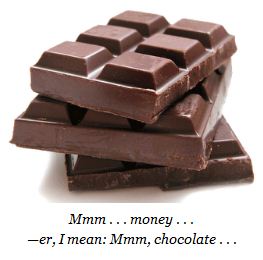 Suppose that I promised to give you free chocolate for the next three years: How much chocolate would you eat today?
Suppose that I promised to give you free chocolate for the next three years: How much chocolate would you eat today?
A pound? Half a pound? A few ounces? Or would you not eat any chocolate at all, once I made the announcement? After all, you’re going to have free chocolate for the next three years—seems silly to gorge on chocolate today, when you can have as much as you’d like tomorrow, or next week, or whenever you want over the next three years.
So free chocolate for the next three years? Great!… uh, only not right now, thanks very much: I’m kinda full.
But then what if I said to you, “Chocolate is free now—but I’m definitely going to raise the price in the near term. In a month, chocolate might be free—or then again, it might cost ,000 an ounce. So get some while you can, because tomorrow, you never know!”
Well, obviously, to such an uncertain outlook, you’d go out and buy some chocolate now—because tomorrow, it might well be unaffordable.
In fact, it seems quite obvious that if you don’t know when I’m going to raise the price of chocolate, you’ll probably wind up buying—and eating—more chocolate than if it was free. A paradox? Sure—but true.
In point of fact, if the chocolate is free, you might not eat any chocolate at all. Every time you make the decision as to what to eat, you might well find yourself repeating the same mantra: “Chocolate is free—I can have it any time I want. So I won’t have any now.”
This is the problem Ben Bernanke and the Federal Reserve currently have—and it’s their own stupid fault: They have promised to maintain interest rates at effectively 0% until at least the end of 2014—they have in fact announced this zero interest-rate policy (ZIRP) as the hallmark of their strategy to reignite the economy—
—but then they’re surprised when businesses aren’t borrowing more. They’re surprised when lending is in fact contracting. They’re surprised when the American economy doesn’t start borrowing—and thus growing—like crazy.
So the American economy obviously doesn’t benefit from ZIRP. In fact, it stagnates because of ZIRP.
Leaving aside the deplorable notion that debt-fueled consumption is “growth”, businesses are not going to borrow to expand during the announced period of ZIRP, because business owners will say, “I’m really not sure if my market is growing—and since I can get a low-interest loan for at least the next three years, I think I’m going to hold off on any expansion of my business, hold off on hiring new workers, and instead wait and see if the economy really does pick up. If it doesn’t pick up, I won’t have more debt to service. And if it does pick up, I can always borrow and expand later.”
“I can always borrow and expand later”: That’s what every sensible business owner is saying today. Why eat free chocolate now—when I can eat it for free later? Why borrow for free now—when I can borrow for free later?
And of course, later becomes never.
See, mainstream economists presume that uncertainty—by definition—is bad. This is why Ben Bernanke and the FOMC are doing this whole “transparency” thing: By announcing their interest rate targets, they think they are giving the markets security. They are trying to eliminate uncertainty insofar as their bailiwick is concerned, by making their monetary policy predictable.
Predictable? Hell, they’ve flat-out announced it.
But uncertainty is not by definition bad. Uncertainty is essentially ambiguity about the future. And as any novelist (such as myself) can tell you, ambiguity per se can be bad—just as easily as it can be good. Why? Because uncertainty about the future can lead people to think that the future will be bad—but also lead them to think that the future might be better.






